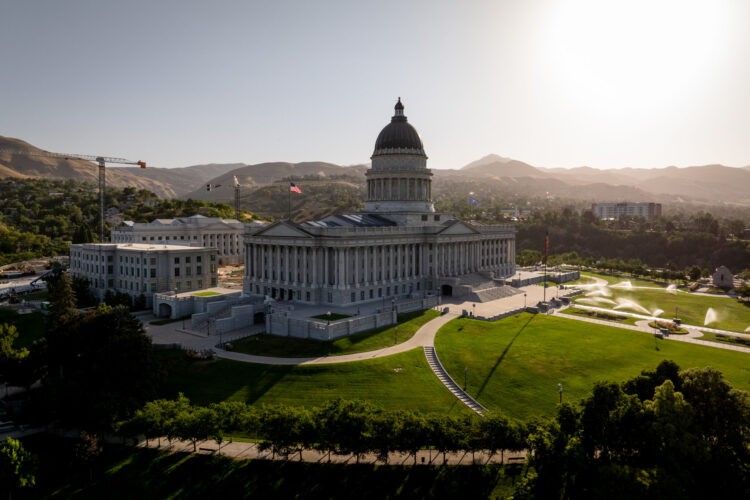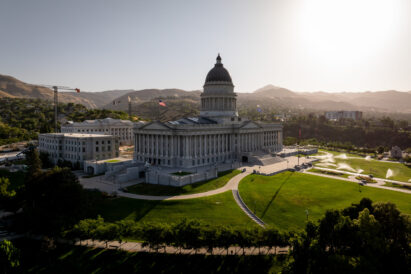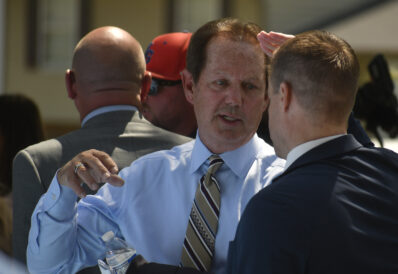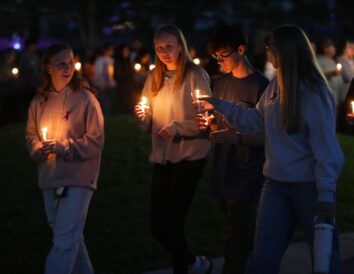Utah Legislature will convene in special session to discuss redistricting and other issues
Gov. Cox called for a special session on Monday with a 13-item agenda

Photo by Spenser Heaps for Utah News Dispatch
The Capitol in Salt Lake City is pictured on Thursday, July 10, 2025.Immediately after a legislative panel is scheduled to vote on new congressional maps, the Utah Legislature will convene on Monday for a special session called by Gov. Spencer Cox with a 13-item agenda, including selecting new congressional district boundaries to submit to a judge and a change in redistricting standards.
Monday also marks the deadline for lawmakers to submit their electoral map to 3rd District Judge Dianna Gibson, who will ultimately decide which congressional districting will remedy the boundaries set in 2021 in what she ruled was an unconstitutional process after Utah lawmakers that year repealed and replaced Better Boundaries’ voter-approved ballot initiative, known as Proposition 4, that sought to create an independent redistricting process.
“The Legislature stands ready to conduct the people’s business and fulfill its constitutional responsibilities. We appreciate Governor Cox for calling a special session to address pressing state issues that require immediate action,” Senate President Stuart Adams, R-Layton, and House Speaker Mike Schultz, R-Hooper, said in a joint statement.
While most of the issues lawmakers are scheduled to discuss during the session are technical updates to laws passed this year, they’ll also consider a couple of controversial proposals in the midst of legal rulings that have overturned some legislative decisions.
One is a draft bill Pleasant Grove Republican Sen. Brady Brammer is proposing, which would establish a statistical method to evaluate future redistricting plans. The proposal adds requirements to the approved redistricting criteria in Proposition 4.
If the bill is approved, future congressional maps would need to pass a “partisan bias test” that evaluates “partisan symmetry.”
The test would use the average margin of past statewide elections to calculate a “partisan symmetry” formula. Maps would pass that test if the same statewide vote percentage translates to the same percentage of seats for either party.
Democrats on the Legislative Redistricting Committee have heavily criticized the method, arguing that only running that one test could be problematic for the state, given the sheer number of registered Republicans in Utah with only four congressional districts up for votes.
However, Brammer said the bill would define a “workable” legal test and establish defined parameters parties can use when proposing maps.
Better Boundaries campaigns against Brammer’s bill
Better Boundaries is also in deep opposition to Brammer’s bill, arguing that it would be another attempt to undermine voters’ will by gutting Proposition 4 and “allowing partisan gerrymandering to continue,” the organization said in a news release.
Just hours after Cox’s special session call, the nonprofit launched a campaign in the legislative districts where Proposition 4 passed, urging lawmakers to vote against Brammer’s bill.
“Utahns passed Proposition 4 in 2018 to ensure districts are drawn with transparency, accountability, and respect for communities rather than partisan interests,” Elizabeth Rasmussen, executive director of Better Boundaries, said in a statement. “The Legislature has a duty to follow the law and respect the will of the people. Brammer’s bill would weaken Prop 4 and threaten the fair process voters put in place. We urge every Utahn to call their legislators and tell them to vote NO.”
The campaign is set to include text messages, billboards, digital ads and mail outreach with messages explaining how the bill could allow “the same kinds of gerrymandered maps already thrown out by the Third District Court.”
“In 2018, Northern Utah voters said ‘YES’ to fairness when they voted for Prop 4. Sen. Sandall said he was complying with the Supreme Court ruling ‘under protest,'” one of the ads reads. “We deserve a representative who puts our voices first.”
The Utah Citizen’s Counsel, a bipartisan group of senior community advocates — including former Democratic House Rep. Joel Briscoe and former Republican House Rep. Becky Edwards — echoed the call to reject Brammer’s bill.
In a letter to lawmakers, the group criticized the single “partisan bias” test approach, saying that “political scientists agree that no single measure can adequately capture partisan symmetry because each has its own weaknesses that can be manipulated or that nonetheless can lead to unfair results.”
Utah Supreme Court chief justice’s pick
The Legislature is also set to study changes to a bill proposed by Sen. Chris Wilson, R-Logan, and vetoed by Cox this year, which would have given the governor the power to appoint the chief justice of the Utah Supreme Court every four years.
That bill was part of a judicial reform package proposed by Republican lawmakers in the 2025 general session after the high court issued decisions that dismayed legislative leaders. Lawmakers said the bills weren’t an act of revenge, but an effort to make the judicial branch more transparent and responsive to Utahns.
Ultimately, the Legislature reached a deal with the judiciary, killing three controversial proposals but keeping Wilson’s bill — before the veto.
While the Legislature didn’t call for a veto override session, Wilson’s bill may still prevail with a key change; the chief justice would have a single, eight-year term, instead of being subject to reappointment every four years, a compromise between lawmakers and the governor.
Lawmakers will also discuss amendments to the law dictating when the Division of Forestry, Fire, and State Lands is able to raise or lower the Great Salt Lake adaptive management berm, a response to the lake’s alarmingly low levels this summer, and a resolution accepting funds for the Rural Health Transformation Program granted in the Congress spending package, known as the “big, beautiful bill.”



